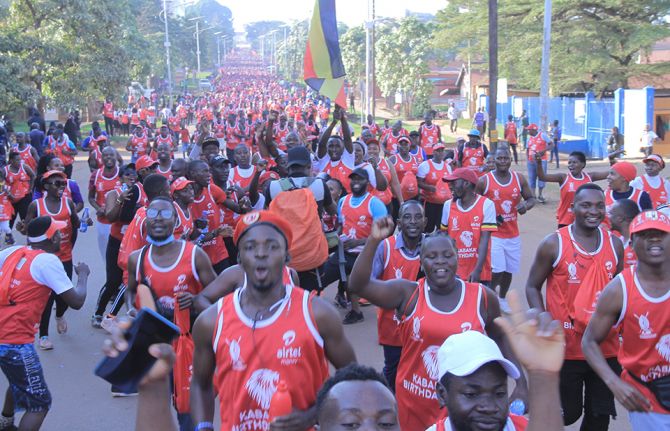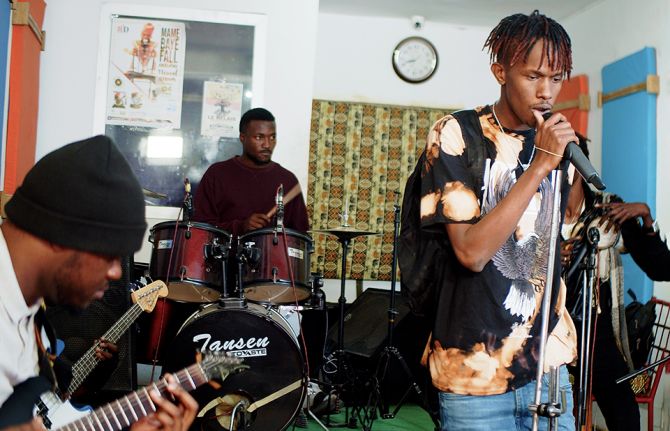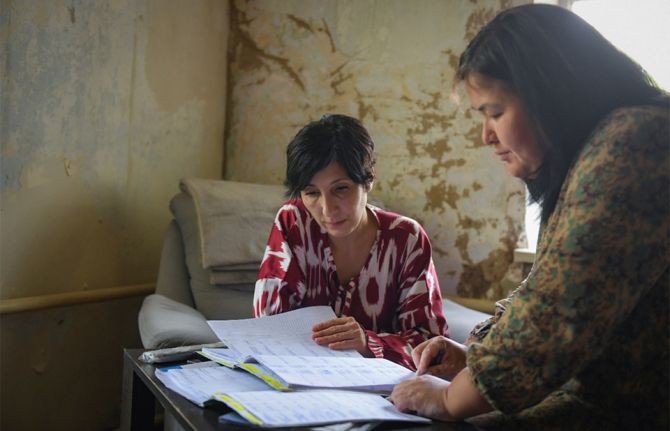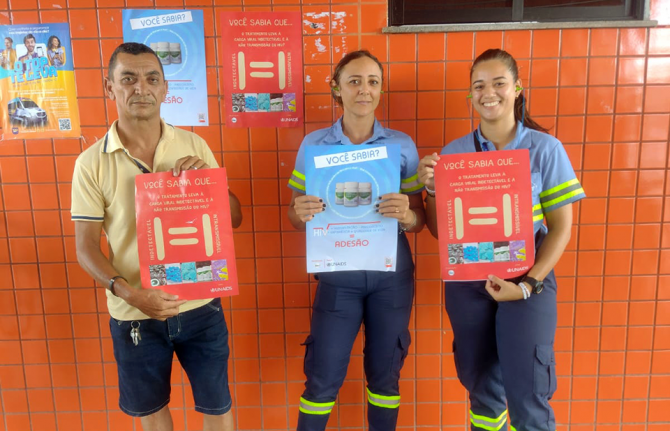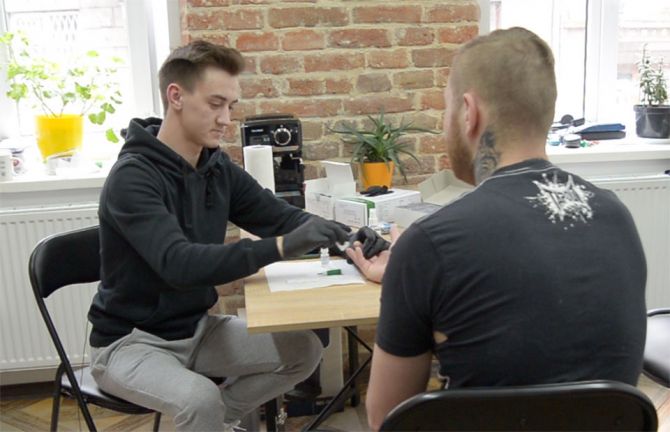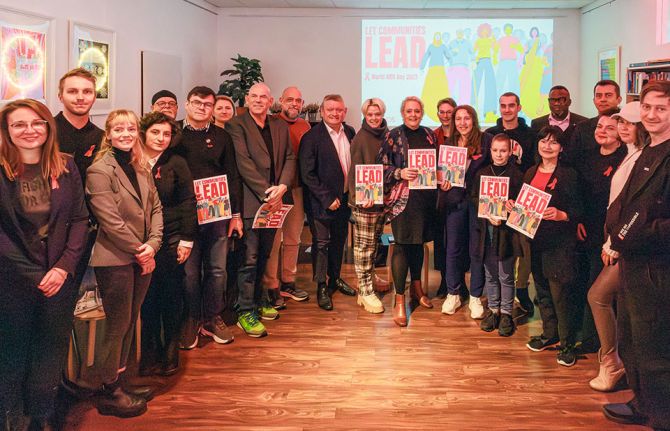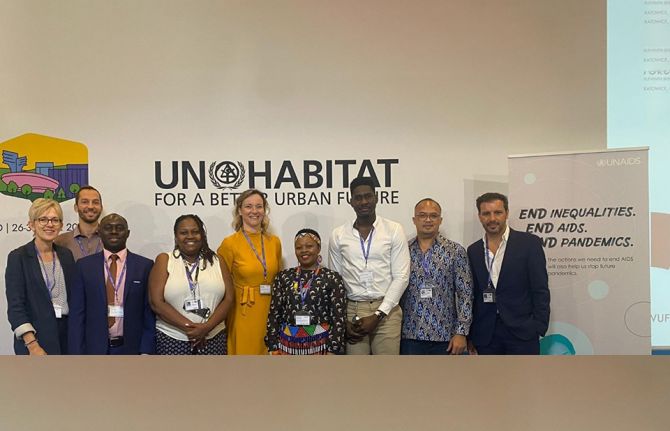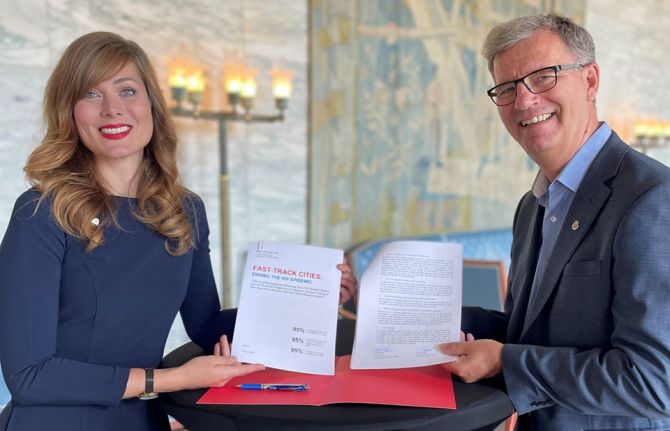
Feature Story
Justice Edwin Cameron adds a new dimension to China - Africa relations
31 October 2008
31 October 2008 31 October 2008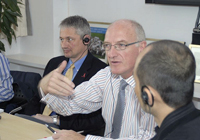
Justice Edwin Cameron at a roundtable discussion on stigma at the UNAIDS office in Beijing. Credit: UNAIDS/Zhou Dao
The South African Supreme Court Judge Edwin Cameron visited China from 27th to 31st October at the invitation of China’s Ministry of Health and UNAIDS. Through his visit, he set out to support the response to AIDS in China with a special focus on legal issues, discrimination and rights of people living with HIV.
Judge Cameron met with Chinese government officials, civil society, business leaders and people living with HIV as well as national and international media. He shared his insights gained from a decade-long battle to address AIDS in South Africa as well as successes and failures of AIDS programmes in Africa and around the world that China may be able to learn from.
Justice Cameron acknowledged that the demographics of the epidemic in Africa and China are different. South Africa has the world’s largest population living with HIV - between 5 and 6 million people - and the epidemic has affected the heterosexual population the most. In China, by contrast, the government estimates that 700,000 people are living with HIV, and the people most at risk of new infection are mainly men who have sex with men (MSM), commercial sex workers, their clients and partners, and intravenous drug users and their partners.
Nonetheless, Justice Cameron noted that the differences between the AIDS epidemics in South Africa and China are less significant than the similarities. “In China, as in South Africa, AIDS is still a disease associated with a terrible stigma,” he observed. That stigma acts as an obstacle to all aspects of HIV prevention and treatment. “Stigma is fatal,” said Justice Cameron. “Stigma prevents people from getting tested, from talking about their positive status, and from seeking help.”

Justice Cameron eating with staff and people living with HIV from the Positive Art Workshop, You An Hospital, Beijing. Credit: UNAIDS/Zhou Dao
In China, the government makes available free HIV testing, but because of stigma people are reluctant to take advantage of it. Indeed, it is estimated that more than 500,000 people may be living with HIV without knowing it. At a roundtable held at the UNAIDS’ offices in Beijing, people living with HIV gave testimonies of the impact of stigma on their lives: One woman who went to the hospital with a cold was told by the doctor not to lie on the bed because she was HIV positive; A man living with HIV now limps because doctors refused to operate on him; Another man living with HIV was told not to eat in the canteen of a local office of the China’s Center for Disease Control.
“Casual transmission of HIV is virtually impossible,” said Justice Cameron. “But the general public in China appears not to know this.” Justice Cameron noted that he would probably have been denied a visa under normal circumstances because of China’s travel restrictions on people living with HIV (the Chinese Ministry of Health facilitated the issuance of a visa to Justice Cameron).
Reducing stigma in society is urgently needed and may require various approaches. At the UNAIDS roundtable, several participants voiced the need for greater education about HIV. Justice Cameron also identified educational outreach as a key activity for reducing stigma, as well as raising awareness around HIV prevention.
Justice Cameron also engaged Chinese audiences on the role of the law in reducing stigma. At Peking University’s law school, he participated in a roundtable discussion on the role of human rights in HIV prevention and AIDS treatment in China. While courts in South Africa have been pivotal in reducing stigma and advancing the rights of people living with HIV, at the present time Chinese courts are in most cases refusing to accept cases dealing with discrimination against people living with HIV.
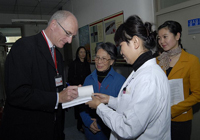
Justice Cameron writing a word of thanks to staff at You An Hospital, Beijing. Credit: UNAIDS/Zhou Dao
But not all stigma comes from external sources. As Justice Cameron wrote in his memoirs, Witness to AIDS, and as he has said to the many groups with whom he has interacted in China, after being diagnosed with HIV he felt contaminated and ashamed. Initially, he believed that his feelings derived from the fact that he had contracted HIV through homosexual sex, but he discovered that such feelings of shame and contamination prevail regardless of the sexual orientation, gender, race, or culture of the HIV-positive individual.
In this regard, Justice Cameron highlighted that experience shows that a strong movement of people living with HIV that affords mutual support and a voice at local and national levels is particularly effective in tackling stigma.
Stigma and accompanying discrimination are widely recognized as significant barriers to HIV prevention, treatment and care services reaching those who need them most. Without concerted action to eliminate stigma, the goal of universal access to these vital services will be impossible to achieve.
Justice Edwin Cameron adds a new dimension to Chi
Press centre:
Read Justice Edwin Cameron’s biography
Feature stories:
Focus on China’s AIDS response (19 September 2008)
Multimedia:
Justice Cameron talks about criminalization of HIV transmission

Feature Story
No room for complacency in the Caribbean challenge to HIV
29 October 2008
29 October 2008 29 October 2008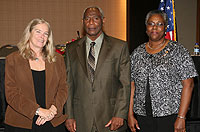
(from left) Michele Moloney-Kitts, Assistant Global AIDS Coordinator, US Department of State: Dr Roy Austin, US Ambassador to Trinidad and Tobago; Dr Karen Sealey, Director, UNAIDS Caribbean Regional Support Team. Credit: Shirley Bahadur
Despite successes in the Caribbean AIDS response, every day in the region 38 people lose their lives to AIDS and 55 become infected with HIV. This was the sobering message delivered by Dr Karen Sealey, UNAIDS Director of the Caribbean Regional Support Team, at the opening of the 7th Annual US Chiefs of Mission Conference on HIV/AIDS in the Caribbean held in Port of Spain, Trinidad and Tobago.
The annual high-level gathering which ran from October 22-23 was organized by the US Embassy in Trinidad and Tobago, in collaboration with USAID and Centers for Disease Control. Ambassadors from the Bahamas, Barbados, Belize, the Dominican Republic, Guyana, Jamaica, Suriname and Trinidad and Tobago attended. Haiti was also represented.
There were myriad challenges to draw their focus. In the region the epidemic is increasingly affecting young women. Disproportionately affected too are people who practice certain behaviours including men who have sex with men, people who buy and sell sex, crack cocaine users and prisoners. Stigma is rife throughout the small island nations of the region and discrimination based on differences in sexual orientation is fuelling the epidemic. Following the recent decriminalization of homosexuality in Panama, the seven countries in the Americas where homosexuality is still effectively a crime are all in the Caribbean.
HIV treatment and prevention
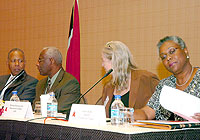
(from left) Patrick Manning, Prime Minister of Trinidad and Tobago; Dr Roy Austin, US Ambassador to Trinidad and Tobago; Michele Moloney-Kitts, Assistant Global AIDS Coordinator, US Department of State; Dr Karen Sealey, Director, UNAIDS Caribbean Regional Support Team. Credit: Trinidad Express
There has, however, been significant momentum in several areas including treatment. In 2003 4000 people were receiving antiretroviral therapy, by the end of 2007 that figure had increased to 30,000.
According to Patrick Manning, the Prime Minister of Trinidad and Tobago who addressed the conference, his country shares in this notable success: “There has been a 50% reduction in reported deaths. Some people have been able to return to relatively normal lives due to treatment from antiretroviral drugs.” He also stressed that complacency remained a clear danger.
Treatment success however has not been matched by prevention success across the region. For every 50 people put on antiretroviral therapy in 2007, there were 100 new infections.
US President’s Emergency Plan for AIDS Relief
One of the main areas for discussion was the second phase of the US President’s Emergency Plan for AIDS Relief (PEPFAR) and how the Caribbean could spearhead implementation. In July President Bush signed the reauthorization of PEPFAR to the tune of US$ 39 billion for AIDS and the Global Fund over the next five years. Haiti and Guyana have been recipients to date however other countries in the Caribbean are set to receive support from this new PEPFAR allocation. Although details of how the region will benefit have not been decided, UNAIDS is committed to helping ensure that this is maximized by working hand in hand with partners in Washington DC and in the region, such as the Pan Caribbean Partnership against HIV/AIDS (PANCAP).
The conference expanded the knowledge base of the US Ambassadors in the Caribbean and encouraged them to use their leadership role to highlight the epidemic and better support their host country’s challenge to it. In the past this gathering has helped to give the Ambassadors a powerful advocacy voice in the region.
Keeping HIV high on the agenda
Looking ahead to 2009, UNAIDS Regional Director Dr Sealey called for AIDS to be kept on the highest political agenda. The Government of Trinidad and Tobago will host three significant gatherings in the coming year; the Summit of the Americas, the First Caribbean Games and the Commonwealth Heads of Government Meeting which present potential opportunities to create new regional momentum in the challenge to HIV.
No room for complacency in the Caribbean challeng
Partners:
US President’s Emergency Plan for AIDS Relief (PEPFAR)
Pan Caribbean Partnership against HIV/AIDS (PANCAP)
Feature stories:
Leaders pledge to promote sexual health to stop HIV in Latin America and the Caribbean (03 August 2008)
Caribbean faith leaders respond to AIDS
Speeches:
Address by Dr Karen Sealey, Director, Caribbean Regional Support Team, UNAIDS
Related

Feature Story
Get ready for World AIDS Day 2008
27 October 2008
27 October 2008 27 October 2008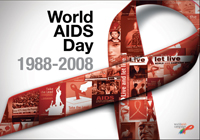
1 December 2008 marks the 20th anniversary of World AIDS Day.
1 December 2008 marks the 20th anniversary of World AIDS Day. Since 1988, efforts made to respond to the epidemic have produced positive results, however, the latest UNAIDS report on the global AIDS epidemic indicates that the epidemic is not yet over in any part of the world.
Together with its partners, the World AIDS Campaign set this year’s theme for World AIDS Day as “Lead – Empower – Deliver”, building on last year’s theme of “Take the Lead”. Designating leadership as the World AIDS Day theme for 2007 – 2008 provides an opportunity to highlight both the political leadership needed to fulfill commitments that have been made in the response to AIDS – particularly the promise of universal access to HIV prevention, treatment, care and support by 2010 – and celebrating the leadership that has been witnessed at all levels of society.
As in previous years, the World AIDS Campaign has produced a wide variety of campaign materials to be used by individuals and organizations that want to campaign on World AIDS Day and host commemorative events. These materials are available on the World AIDS Campaign web site at www.worldaidscampaign.org. The web site also has a calendar of events where organizations are encouraged to list information on their planned activities for World AIDS Day.
The concept of a World AIDS Day originated at the 1988 World Summit of Ministers of Health on Programmes for AIDS Prevention. Since then, every year UN agencies, governments and all sectors of civil society worldwide join together to campaign around specific themes related to AIDS.
Get ready for World AIDS Day 2008
Partners:

Feature Story
UN Secretary General’s Special Envoy Dr Nafis Sadik urges a broader approach to AIDS in China
24 October 2008
24 October 2008 24 October 2008
Dr. Nafis Sadik (left), together with Dr. Zhao Hongxin (AIDS Treatment Division), Dr. Li Xingwang (Director of Infectious Disease Centre), and Bernhard Schwartlander (UNAIDS Country Coordinator) outside Ditan Hospital, Beijing, China.
“Know your epidemic,” advised UN Special Envoy on AIDS in Asia, Dr Nafis Sadik, at a public lecture held on 16 October 2008 in Beijing. “Because we’ve learned that there’s no return on policies made in ignorance, nor on programmes directed at the wrong population demographic.”
In particular, Dr Sadik urged focus on the following areas: the social stigma and discrimination affecting people living with HIV in China; the connections between women’s reproductive health and HIV; and the differential risks borne by various groups, including people you inject drugs, men who have sex with men, commercial sex workers, youth, and the sexual partners of people who engage in high risk behaviours.
“Prevention is not a health matter; it’s a behaviour matter”
Addressing shortfalls in these areas requires changing people’s behaviour, a task that is broader than treating a disease. As Dr Sadik explained, by categorizing HIV as a communicable disease problem, China is missing an opportunity for prevention efforts. “A hospital’s role in preventing HIV is important but limited because it doesn’t see people until they are ill,” she cautioned. “But prevention is not a health matter; it’s a behaviour matter.”
In China, patients with AIDS-related illnesses are treated in specialized rather than in general hospitals and Dr Sadik cautioned against the effect this has on stigma and discrimination. During her visit to Ditan Hospital in Beijing, Dr Sadik met with seriously ill patients living with HIV. Many of them have developed multiple resistance to tuberculosis and antiretroviral drugs but none are receiving lifesaving so-called 2nd line therapy.
Political commitment
While the Chinese government’s prioritization of HIV is sincere, and impressive progress has been made, Dr Sadik emphasizes the importance of political commitment. In countries like Cambodia and Thailand, and in the Indian state of Tamil Nadu, where HIV prevention efforts are seeing greatest results, the common factor is political commitment. Moreover, top-level government involvement is particularly useful for combating stigma and discrimination. “Cambodia’s prime minister never misses an opportunity to work AIDS into a speech,” she reports.
“China can be a leading success story,” Dr Sadik maintains, a message that she drove home during a meeting yesterday at the Red Ribbon Center, a support centre for men, women and children living with HIV. The centre is housed in Ditan Hospital and provides HIV testing and care, information, psychological support, training for volunteers, and legal aid support.
Tenacious problem of stigma
Discussing the tenacious problem of stigma and discrimination against people living with HIV, the staff at the Red Ribbon Centre expressed the opinion that better education is necessary. Agreeing, Dr Sadik also recommended more effective advocacy. “The message shouldn’t be that AIDS is a terrible disease, and that people who have it will die. The message should be that people with HIV can have a normal life expectancy.”
Dr Sadik rejects the notion that AIDS education and advocacy are antithetical to Asian culture because they necessitate frank discussion of sex or other issues that might cause embarrassment. “We hear the argument that Asian value systems are being preserved by not discussing matters like HIV and AIDS,” she admitted, “but what value system wants to put their young people at risk of contracting a serious condition?”
Studies from around the world, in Asian cultures as elsewhere, shows that knowledge and education to youth on sex and AIDS issues does not promote promiscuity, but on the contrary is a very important way to ensure that young people are informed to protect themselves – by postponing first sexual intercourse, remaining faithful and using condoms. Traditional culture and the health of young people cannot be effectively protected by ignorance.
“Changing the focus of HIV and AIDS efforts from health to social issues doesn’t necessarily require a lot of money,” she reflected. “But it does require a lot of champions.”
High-Level Forum on Poverty Reduction and Development
During her visit to Beijing Dr Sadik gave a keynote speech on HIV and Gender at the High-Level Forum on Poverty Reduction and Development in Beijing on 17 October which was organized by UNDP. She also met with government officials and people living with HIV to advocate for a strengthened and gender sensitive response to HIV in China.
Dr Sadik, a national of Pakistan, was appointed Special Envoy of the Secretary-General for HIV/AIDS in Asia in 2002. She earlier served as Executive Director of the United Nations Population Fund (UNFPA) from 1987 through 2000.
UN Secretary General’s Special Envoy Dr Nafis Sad
Cosponsors:
Feature stories:
Dr Nafis Sadik advocacy visit to Tajikistan and Kyrgyzstan, September 2006

Feature Story
UNAIDS Executive Director and Princess of Norway on AIDS advocacy mission in Ukraine
21 October 2008
21 October 2008 21 October 2008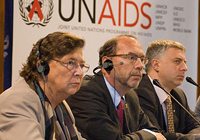
L to R: Dr Sigrun Mogedal, Ambassador for HIV/AIDS, Ministry of Foreign Affairs, Norway; Dr Peter Piot, UNAIDS Executive Director; Professor Serghiy Kvit, President, Kyiv-Mohyla Academy.
UNAIDS Executive Director Dr Peter Piot and UNAIDS Special Representative, Her Royal Highness Crown Princess Mette-Marit of Norway were in the Ukrainian capital Kiev this week to call for strengthened leadership in the AIDS response in the country which has Europe’s most severe AIDS epidemic.
During their two-day visit in Kiev, Dr Piot and the Crown Princess met with key representatives from government and civil society to support efforts to stop the spread of HIV and address the growing needs of people living with HIV.
Their mission began with a visit to the All-Ukrainian Network of People Living with HIV, which provided a glimpse into the successful involvement of people living with HIV in Ukraine’s response and the challenges that remain.
Dr Piot later addressed the Presidential Council of Ukraine where he commended the country on its progress in responding to AIDS and engaging with civil society including people living with HIV.He recognized President Yushchenko’s unprecedented leadership on AIDS and acknowledged the recent expansion of access to HIV prevention and testing for people who need them most, such as people who inject drugs. He noted the increased numbers of people accessing HIV treatment and the Government’s commitment to make treatment available to all those in need.
President Yushchenko thanked Dr Piot for his leadership in the global response to AIDS, and recognized the contributions of UNAIDS “for its significant support and reliable partnership in addressing the epidemic in Ukraine”.
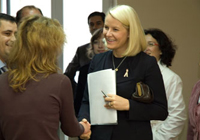
The Crown Princess Mette-Marit of Norway, UNAIDS Special Representative, greets Ms Natalia Leonchuk, Executive Director, East European and Central Asian Union of PLWH Organizations at the beginning of a meeting with Representatives of All-Ukrainian Network of People Living with HIV. Kyiv, Ukraine 20 October 2008. Credit: UNAIDS/Yuriy Shkoda
Wanting to learn more on young people’s involvement in the country’s AIDS response, the Crown Princess met with a group of young people active in HIV prevention and peer education activities. Together, they shared experiences and thoughts on how best to involve youth and reach this important demographic in Ukraine.
This advocacy visit comes at a critical juncture in Ukraine’s response to AIDS. Latest figures from UNAIDS’ 2008 Report on the global AIDS epidemic estimates some 440,000 people are living with HIV in Ukraine and the adult HIV prevalence of 1.6% is the highest in Europe.
Ukraine’s HIV epidemic is concentrated among people who inject drugs, their sexual partners, sex workers, men who have sex men, and people in prison settings.
In meetings with civil society Dr Piot stressed the urgency to increase coverage and improve quality of prevention programmes among most-at-risk groups. Dr. Piot recognized Ukraine’s leadership in implementing intravenous drug substitution therapy, but stated that these programmes need to be scaled-up more quickly. Equally important is eliminating stigma and discrimination which is a major challenge in Ukraine and elsewhere in Eastern Europe.
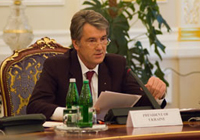
Viktor Yushchenko, President of Ukraine addresses the meeting of Coordination Council on HIV/AIDS, Tuberculosis and Illicit Drug Control. Dr Peter Piot, UNAIDS Executive Director also participated in this meeting. Kyiv, Ukraine; 20 October 2008. Credit: UNAIDS/Yuriy Shkoda
The Ukrainian Government has placed youth awareness of AIDS as a national priority. Currently national indicators reveal that just 40% of young people in the country (15-24 years) know how to protect themselves against HIV infection and reject misconceptions about the virus. Unless prevention programmes reaching out to young people are significantly increased in the coming years, Ukraine could fall short of the UNGASS target that by 2010 at least 95% of young people know how to reduce their vulnerability to HIV infection.
Despite the significant progress made, Dr Piot urged national partners to mount an even greater AIDS response that focuses on preventing new HIV infections through the tailoring of prevention efforts to local contexts. To do this, and to meet other vital components of the national response, greater domestic resources will be required to ensure the sustainability of programmes that are currently supported from donors.
Dr Piot encouraged his counterparts in government and civil society to build stronger partnerships among all sectors of Ukrainian society – including the private sector – as a means to scale-up the country’s response to AIDS.
UNAIDS Executive Director and Princess of Norway
Feature stories:
Lars Kallings: UN Special Envoy for AIDS in Eastern Europe and Central Asia (20 October 2008)
Making a difference: UNAIDS in Ukraine (8 January 2008)
Princess of Norway visits grassroots AIDS organization (06 November 2007)
UNAIDS Special Representative, Her Royal Highness Crown Princess Mette-Marit of Norway, launches book “If I kept it to myself” (15 August 2006)
HRH the Crown Princess of Norway visits the UNAIDS Secretariat, Geneva (25 April 2006)
%Speeches:
Speech by Her Royal Highness the Crown Princess Mette-Marit of Norway to Kyiv-Mohyla Academy, Ukraine (21 October 2008)
Delivered on behalf of Her Royal Highness by Dr Sigrun Mogedal, Ambassador for HIV/AIDS, Ministry of Foreign Affairs, Norway.
%External links:
Official Website of Victor Yushchenko, President of Ukraine
Official web site of the Royal house of Norway
%Multimedia:
View photo gallery from this visit to Ukraine
Publications:
Related

Feature Story
Leadership and AIDS: Festus Mogae
20 October 2008
20 October 2008 20 October 2008
Festus Mogae the former President of Botswana was awarded the Ibrahim Prize for Achievement in African Leadership on 20 October 2008.
On 20 October 2008 Festus Mogae the former President of Botswana was named the winner of the Ibrahim Prize for Achievement in African Leadership.
Announcing the 2008 Ibrahim Laureate, Kofi Annan, the Chair of the Prize Committee, said: “President Mogae’s outstanding leadership has ensured Botswana’s continued stability and prosperity in the face of an AIDS pandemic which threatened the future of his country and people.”
“The former President of Botswana has demonstrated what leadership – and perseverance – can achieve in the face of extreme challenges – the Ibrahim Prize represents a pinnacle in Mr Mogae’s efforts to stop the spread of HIV, not only in Botswana but throughout Africa. He is a true visionary and an exemplar to other leaders around the world,” said UNAIDS Executive Director Dr Peter Piot.
In what ways has Mogae’s leadership made a difference in Botswana’s AIDS response?
Festus Mogae was President of Botswana from 1998 to 2008 and made the AIDS response one of the top priorities of his administration. Botswana is a small prosperous country yet with 24% of adults aged 15-49 estimated to be living with HIV; the country has one of the world’s highest HIV prevalence rates. More than one third of all deaths in children under 5 are due to AIDS.
Although HIV is such a heavy toll on the population, thanks to government leadership and the dedication of considerable domestic resources to HIV, the country has made significant progress in its response to the disease.
Botswana was the first African country to embark on a programme of rolling out free antiretrovirals to all its citizens living with HIV in need and in 2007 delivered HIV treatment to more than 90% of those who need them. In addition to treatment, it has made impressive strides in preventing mother-to-child HIV transmission and caring for children orphaned by AIDS.
The country has also been a leader in expanding voluntary HIV testing and counselling – the offer of HIV testing has been routine in all health care settings since 2004.

HE President Festus Mogae (left) met Ms. Ann Veneman UNICEF Executive Director and Dr Peter Piot UNAIDS Executive Director on their official visit to Botswana in October 2007. Credits: UNAIDS
A key catalyst for progress in Botswana’s AIDS response was the establishment in 2000 of the African Comprehensive HIV/AIDS Partnership (ACHAP). This innovative collaboration to improve access to needed HIV services is a country-led public/private development partnership between the Government of Botswana, the Bill & Melinda Gates foundation and pharmaceutical company Merck & Co., Inc. and the Merck Company Foundation.
Writing at the time of the launch of ACHAP, then President Mogae emphasized the need to implement care and treatment alongside a prevention drive to look after people already living with HIV in order to ensure their continued contribution to family life and ongoing economic growth in the country.
“Champions for an HIV-free Generation”
Festus Mogae stepped down from the Presidency earlier this year but he continues to be committed to AIDS leadership in Africa.
On 5 August 2008 he launched “Champions for an HIV-free Generation,” a group of renowned African leaders calling for their peers to rethink and step up efforts to prevent the spread of HIV. The collaborating partners of this initiative are the World Bank, UNAIDS, the World Health Organization, the Bill & Melinda Gates Foundation, the Global Fund to Fight AIDS, Tuberculosis and Malaria, and PEPFAR.
The Champions, highly visible leaders from all over Africa and different walks of life, will mobilize leadership in Africa and advocate effective policies and action on HIV prevention. As outspoken opinion-leaders, they will seek to initiate a dialogue in changing behavioural and societal norms. This year’s World AIDS Day will celebrate the theme of leadership. The award to Festus Mogae of the Ibrahim Prize for Achievement in African Leadership is in recognition of his good governance and the legacy of former President should inspire other leaders in scaling up access in their countries to HIV prevention, treatment and care services.
Mo Ibrahim Foundation
The Mo Ibrahim Foundation was launched in October 2006 and is committed to supporting great African leadership. The Prize Committee is chaired by former United Nations Secretary-General Kofi Annan and comprised of Martti Ahtisaari, former President of Finland and Nobel Laureate; Aïcha Bah Diallo, former Minister of Education in Guinea and Director of Basic Education at UNESCO; Mohamed ElBaradei, Director General of the International Atomic Energy Agency and Nobel Laureate; Mary Robinson, former President of Ireland and former UN High Commissioner for Human Rights; Salim Ahmed Salim, former Secretary-General of the Organisation of African Unity and former Prime Minister of Tanzania.
Leadership and AIDS: Festus Mogae
Feature stories:
Progress and challenges for Botswana (18 October 2007)
Joint mission to Botswana – UNAIDS, UNICEF and the Bill & Melinda Gates Foundation (18 October 2007)
Press centre:
Festus Mogae wins the largest prize in the world (20 October 2008)
President Mogae Launches “Champions for an HIV-free Generation” (5 August 2008)
External links:
Mo Ibrahim Foundation
African Comprehensive HIV/AIDS Partnerships (ACHAP)
World AIDS Campaign
Related
 “Who will protect our young people?”
“Who will protect our young people?”

02 June 2025
 Impact of US funding cuts on HIV programmes in Uganda
Impact of US funding cuts on HIV programmes in Uganda

19 March 2025

Feature Story
Lars Kallings: UN Special Envoy for AIDS in Eastern Europe and Central Asia
20 October 2008
20 October 2008 20 October 2008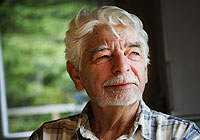
Professor Kallings a Swedish national, was appointed Special Envoy for AIDS in Eastern Europe and Central Asia by the UN Secretary-General in May 2003.
Professor Kallings a Swedish national, was appointed Special Envoy for AIDS in Eastern Europe and Central Asia by the UN Secretary-General in May 2003. He was the founding President of the International AIDS Society in 1988. As its Secretary-General from 1994 to 2002, he played a key role in shaping the IAS as the world’s first global society for scientists and health care workers committed to the prevention and treatment of HIV. He has also been an adviser to the World Health Organization, Chairman of the Global Commission on AIDS and Senior Adviser to the Global Programme on AIDS on Scientific and Policy Affairs.
In the second of a series of interviews with the UN Special Envoys for HIV/AIDS, Professor Kallings shares his views on his role and the challenges facing the AIDS response in Eastern Europe and Central Asia.
Professor, what motivates or inspires you to work on AIDS?
As a boy during the 1930s I was struck by the ravages of tuberculosis on the Swedish countryside, in particular, witnessing a bonfire made of all the belongings of a whole family annihilated by tuberculosis made a deep impression on the mind of me as eight years of age. On a clay field in the ice-cold March wind, still with snow in the furrows, I watched everything burning, the grandfather's clock, furniture, clothes, even a beautiful shotgun on the top. The local health authority did not know better than to order everything burnt to eradicate the bacilli - that big was the fear of the disease.
As a doctor I specialized in clinical microbiology and infectious diseases, especially interested in opportunistic infections among immune-compromised patients, such as children with leukemia.
When I became Director of the Swedish Institute for Infectious Disease Control public health was in focus for my responsibilities. In addition, I was all the time engaged in international projects, not the least with World Health Organization.
The second strong motivation, and also my inspiration, is meeting with people affected by HIV in poor countries, be it in African villages and hospitals or in brothels in Mumbai, India or Chiang Mai, Thailand, or among injecting drug users in Belarus or Ukraine. The courage, warmth and concern of the people I have met for fellow human beings in spite of their own misfortune have touched and inspired me deeply.
How do you see your role as Special Envoy of the UN Secretary-General for HIV and AIDS?
My role as a UN Special Envoy as I see it, is to reach the highest political leadership of countries to address the central and sensitive issues directly circumventing bureaucracy and conventional avenues. I am not paying courtesy visits, but heading for results. There are no special rules for a Special Envoy—that is what makes them special!
For instance, my meetings with President Viktor Yushchenko of Ukraine have resulted in directives of key importance to the National AIDS Programme, including allowing the importation of methadone for substitution treatment for injecting drug users.
What unique qualities do you bring?
My white hair serves me well. Knowledge, experience, and always having justified and verifiable views. My words can have the impact of a volley hitting a ship at the waterline.
How can you make a difference?
I can make a difference by being well prepared, basing recommendations on impartial facts, while being empathic and intensely engaged.
What's your proudest achievement as Special Envoy for HIV and AIDS?
As Special Envoy, the proudest achievement has not happened yet! Before that, my proudest achievement was to bring the International AIDS Conference to Durban, South Africa in 2000. That was a landmark event and opened the eyes of the world to the enormous catastrophe of HIV. The "Durban effect" cannot be overestimated. Without that global awareness I do not think that the 2001 UN General Assembly Special Session on HIV/AIDS would have happened, nor the creation of the Global Fund to Fight AIDS, TB and Malaria.
What are the main challenges facing the Special Envoy in Eastern Europe and Central Asia?
The main challenge in Eastern Europe is to overcome the traditional, deeply-rooted contemptuous view of drug users, sex workers and homosexuals.
Also much of my efforts focus on getting civil society recognized by Governments in Eastern Europe. During the Soviet Union, non-governmental organizations (NGOs) did not exist as by definition the State was supposed to take care of everything the people needed and civil society activities were considered as subversive actions.
Still today, in some countries, NGOs are looked upon with suspicion as potential Trojan horses supported by Western countries. Therefore, I am attempting to bring people living with HIV and NGO representatives to sit alongside me at the table of the Presidents, which has made a difference and been welcomed for instance in Ukraine.
Another Special Envoy activity is to bring focus to neglected areas such as prisons which are breeding grounds for intravenous drug use, HIV, hepatitis C and tuberculosis (TB). For instance, I visited a prison with prisoners living with HIV and multi drug resistant TB outside Tbilisi, Georgia together with the First Lady who has a key role in the national HIV programme. Despite some progress in the region, I still see no harm reduction and substitution treatment allowed in prisons in Ukraine, while those programmes are widely available outside prison settings.
What in your view are the particular challenges facing this region?
Improving living conditions, including expanded employment possibilities for young people as well as improving the self esteem of both girls and boys and including education on sex and personal relations in schools are all important social challenges, as well as improving gender equity.
The widely different socio-economic conditions between nations and within parts of countries make the HIV epidemics in Eastern Europe and Central Asia very heterogeneous.
Another problem is that the region faces a future health care crisis unless many more people currently living with HIV get antiretroviral treatment to prevent them developing AIDS and becoming ill.
What do you think are possible solutions?
The only possible solution is to scale-up access to HIV prevention and treatment services. That has not happened yet, but the region has that capability should the political will be there. Good attempts on a small scale are fine but only a full response will help. In these efforts, the leadership of the governments is a key. I also look forward to developing activism around HIV prevention as activism in HIV treatment alone won’t get us too far with combating the HIV epidemic.
Which successes in the AIDS response make you optimistic about the future?
There seem to be some inborn difficulties to coordinate efficient responses in some countries and several countries continue to overly rely on foreign aid instead of increasing spending from their own national budgets. However, the greatly increased awareness about the AIDS epidemic among the political leaders compared to only a few years ago makes me optimistic.
Lars Kallings: UN Special Envoy for AIDS in Easte
Feature stories:
Journal of Internal Medicine: Review article by L. O. Kallings
(21 February 2008)
Professor Lars Kallings’ advocacy visit to Belarus
(25 October 2006)
UN Special Envoy for AIDS in Africa Elizabeth Mataka
(15 September 2008)
Publications:
Related

Feature Story
Be a winner with Michael Ballack and UNAIDS online competition
20 October 2008
20 October 2008 20 October 2008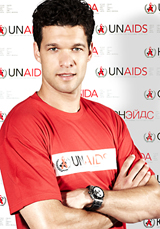
UNAIDS Goodwill Ambassador and international football star
Michael Ballack
Credit: UNAIDS/Oliver Beckmann
UNAIDS Goodwill Ambassador and international football star Michael Ballack and UNAIDS are proud to team up for an online competition.
To win one of many great prizes courtesy of “Michael Ballack Clothing” and UNAIDS —including caps, t-shirts, and sweatshirts just answer the following questions:
Questions
1. UNAIDS is a Joint United Nations Programme composed of a Secretariat and Cosponsoring organizations. Name any two of UNAIDS Cosponsors.
2. In his video message, what is UNAIDS Goodwill Ambassador Michael Ballack’s personal video message about HIV prevention? Watch the video on YouTube !
Send your answers along with your full name and address by email to: competition@unaids.org
Closing date is 20 November 2008 and competition winners will be announced on World AIDS Day, 1 December 2008.
Michael Ballack has been a UNAIDS Goodwill Ambassador since 2006. Through a series of campaigns he raises awareness about HIV prevention among young people and will continue to support UNAIDS in the run-up to the FIFA World Cup in South Africa in 2010.
Be a winner with Michael Ballack and UNAIDS onlin
Related

Feature Story
Sidibe highlights the role of civil society in countries’ AIDS responses
16 October 2008
16 October 2008 16 October 2008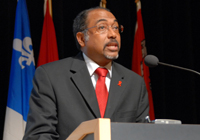
UNAIDS Deputy Executive Director Michel Sidibe addressed the vital role of civil society at “Rendez-vous de la coopération québécoise et canadienne dans la Francophonie” hosted by the Canadian International Development Agency (CIDA).
Ahead of the XIIe Sommet de la Francophonie, the role of civil society in development and international cooperation is being discussed at an important pre-conference event taking place in Quebec City 15-17 October.
“Sustainable partnerships” is the central theme of the “Rendez-vous de la coopération québécoise et canadienne dans la Francophonie” hosted by the Canadian International Development Agency (CIDA), a meeting to explore Quebec and Canada’s role in international cooperation in French-speaking countries.
On 15 October UNAIDS Deputy Executive Director Michel Sidibe took part in a keynote event. Mr Sidibe reflected on the crucial role that civil society plays in an effective AIDS response in Francophone Africa and elsewhere, citing examples of successes in specific countries.
“In this global mobilization for AIDS, civil society has undoubtedly been the determining catalytic agent that has often initiated, consolidated and always brought forward new ideas and concern around human rights, addressing the virus and inspiring international organizations and traditional bilateral cooperation,” said Mr Sidibe. “Civil society has always been present in all major decisions in the AIDS response,” he continued.
Describing the vital importance that civil society plays in AIDS response at this turning point in the epidemic, he outlined its ability to speak with many voices, represent many different perspectives, mobilize political leadership, ensure a rights-based approach to HIV responses and bring life-saving prevention messages directly to communities.
The importance of securing input from the full spectrum of civil society, including people living with HIV, cannot be overstated. The wide range of strategic and tactical expertise within civil society organizations makes them ideal partners in the process of preparing National Progress Reports and specifically, civil society organizations are well positioned to provide quantitative and qualitative information to contribute to the data collected by governments.
UNAIDS has a range of specific tools to help civil society make an impact including the Technical Support Facilities to assist and solve problems in strategic planning, communications, resource mobilization and tracking and monitoring and evaluation. This reinforces national capacity and supports countries have a country-owned, country-led and demand-driven AIDS response.
Other speakers at the event were Mrs Djakagbè Kaba, President of the Guinean Network of Economic and Social Solidarity, RéGESS (Guinea); Mrs Danièle Magloire, Coordinator of the Bureau of Rights and Democracy (Haïti) and Mr Bakary Doumbia, Director-General of KILABO (Mali).
XIIe Sommet de la Francophonie

The governments of Canada and Québec, in partnership with the Government of New Brunswick, are hosting this year’s Francophonie Summit which takes place in Québec City from 17 to 19 October and will include delegations from some 69 states and governments. Mr Sidibe will attend the opening of the Summit.
The Summit is a gathering of the heads of state and government of member countries in the Organisation internationale de la Francophonie (OIF), an institution founded on the basis of a shared language (French) and shared values. It has 55 member states and governments and 13 observer states, representing a total population of 803.4 million and close to one-third of all United Nations member states. It supports member states in policy development and spearheads political action for multilateral cooperation.
HIV epidemics
While sub-Saharan Africa’s epidemics vary significantly from country to country in both scale and scope, the region is home to 67% of people living with HIV worldwide and almost 90% of all children living with HIV. On a positive note, most of the comparatively small HIV epidemics in West Africa are stable or are declining—as is the case for Burkina Faso, Côte d’Ivoire, and Mali. In Côte d’Ivoire, HIV prevalence among pregnant women in urban areas fell from 10% in 2001 to 6.9% in 2005.
However in 2007, adult national HIV prevalence was above 5% in seven countries in Central and East Africa including Francophone Cameroon, the Central African Republic and Gabon. More than one third (35%) of female sex workers surveyed in 2006 in Mali were living with HIV, and infection levels exceeding 20% have been documented among sex workers in Senegal and Burkina Faso.
Sidibe highlights the role of civil society in co
Feature stories:
Strengthening the AIDS response in Portuguese speaking countries (28 July 2008)
Multimedia:
External links:
Organisation internationale de la Francophonie [in French only]
XIIe Sommet de la Francophonie
Canadian International Development Agency (CIDA)
Rendez-vous de la coopération

Feature Story
World Lung Health experts discuss TB and HIV
15 October 2008
15 October 2008 15 October 2008
Living with TB in Kolkata, India. Credit: LHIL/Kaushik Sengupta/Drik
Tuberculosis (TB) is the leading cause of illness and death among people living with HIV in many parts of the world, yet TB is mostly curable and preventable.
In 2006 less than 1% of people living with HIV were screened for TB yet an estimated one-third of people living with HIV worldwide are co-infected with TB and at a high risk of developing TB disease.
In spite of the two diseases being so inextricably linked, for many years, efforts to tackle HIV and TB were largely separate. Recognising the importance of a coordination of efforts, the Union World Conference on Lung Health which runs from 16 to 20 October 2008 will hold a series of symposia on TB and HIV.
The 39th Union World Conference on Lung Health of the International Union against Tuberculosis and Lung Disease (The Union) takes place at the Palais des Congrès in Paris, France,. The theme of this year’s conference is “Global threats to lung health: the importance of health system responses”. In addition to some 14 symposia, a Special Session on TB/HIV programme collaboration will be held. The outcomes of this session will be followed up in 2009 Union World Conference on Lung Health.
“The lethal interaction between the HIV and TB epidemics is both a threat to global lung health and to the lives of people living with HIV,” said Alasdair Reid, UNAIDS HIV/TB Adviser.
“Increasing collaboration between TB and HIV programmes as highlighted at this conference strengthens our joint response and helps to overcome health system constraints to delivering universal access and saving lives,” Reid added.
The aim is to facilitate dialogue and exchange experiences between TB and HIV experts as it is universally recognised that improved collaboration between TB and HIV programmes will lead to more effective prevention and treatment of TB among people living with HIV and to significant public health gains.
Kaisernetwork.org is the official web caster of the 39th Union World Conference on Lung Health, providing access to daily conference developments.
World Lung Health experts discuss TB and HIV
Cosponsors:
Multimedia:

View Kaiser webcast of the 39th Union World Conference on Lung Health
External links:
39th Union World Conference on Lung Health
International Union Against Tuberculosis and Lung Disease
NAP and NTP Special Session: Successes and challenges for collaboration in TB-HIV activities
Roadmap HIV&TB/HIV Symposia 16-20 October 2008








